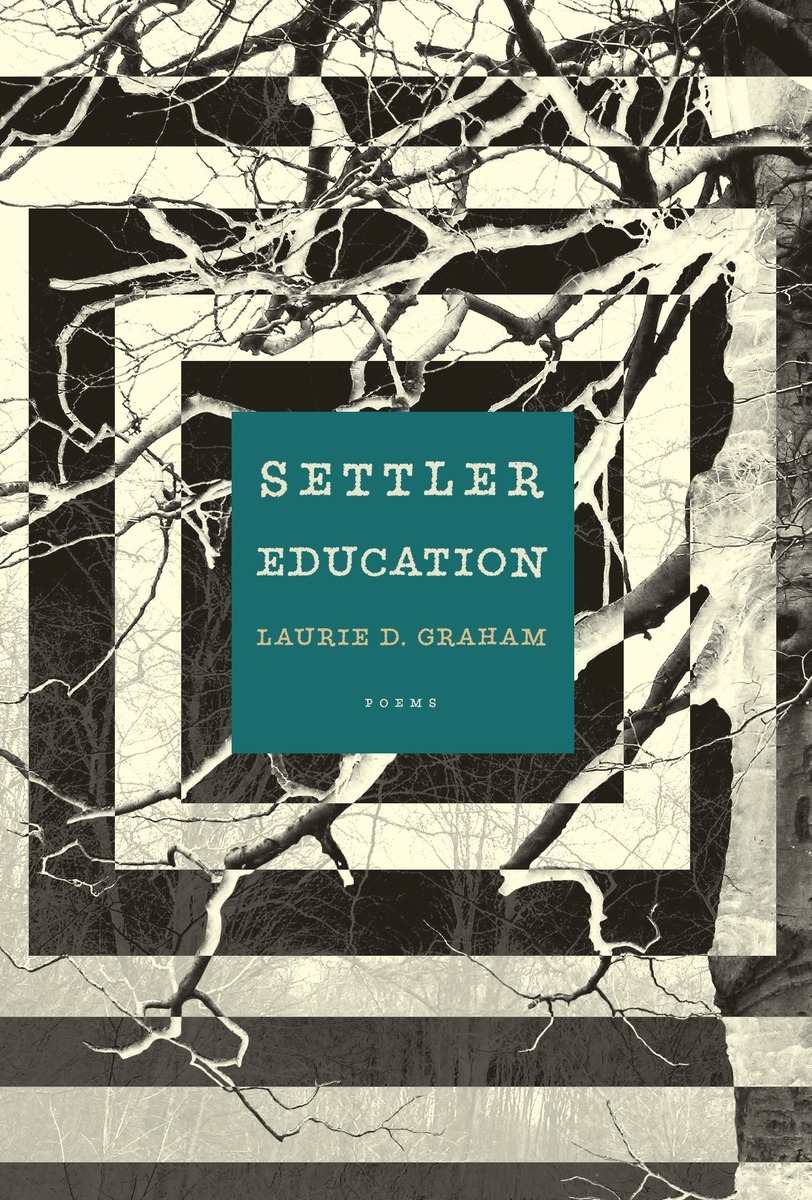
Settler Education by Laurie D. Graham (McClelland & Stewart)
Laurie D. Graham’s second collection, Settler Education, is a historically informed book of poetry. It roams through Canada’s past, focusing on the destabilizing impact of colonialism, particularly on the indigenous population of North America, but also on European settlers. Poem titles zoom in on formative historical moments or famous personages: “Frog Lake,” for example, refers to the North West Rebellion or Resistance of 1885, while “Mistahimaskwa / Big Bear” gives voice to the powerful Cree chief of the same era. In order to maintain a sense of historical accuracy within the fluidity of the poetic genre, Graham includes lengthy direct quotations from recorded speeches and journals, as well as archival photographs and maps; she offers informative endnotes describing the material she writes about. Following her debut, Rove, which also deals with regional identity and growing up in homestead in a colonial prairie settlement, Settler Education continues to navigate ways of being on a map of politically fraught geography. As she queries incisively, “am I supposed to claim I know this land, that I know where my limits are placed” (24)?
Although Graham’s primary sympathy lies with displaced indigenous peoples, she approaches the complexity of settler history in Canada from different perspectives throughout. “The assumption is you’ll pick a side / then doubt it. The goal is the truth made plain and singular” (63), she writes sardonically. Instead of maintaining a clear critical thesis, she illustrates, on the one hand, how indigenous communities were systematically forced to surrender their land, language, beliefs and integrity, while on the other hand, contrasting a retrospective gaze with the contemporary experience of coming to terms with ancestral crimes, the grand question of how to exist in Canada today.
There are four things you will not learn in school.
The name of the people. The name of the treaty.
The name of the nearest reserve. The name of the closest school.
This is where you are from.
The school well off the highway and protected. The reserve not yours.
The treaty taught as history, if at all. The people,
nehiyaw and Métis, who live close and speak your language
you won’t even register as different from you (70)
Graham lays her finger on a significant double bind. It may seem important to remove the sense of otherness when integrating cultures that cohabit a continent. Not registering someone from an unfamiliar background as different could be interpreted as a positive gesture of interpersonal acceptance. Yet clearly, obtaining this nominal acceptance only through an uninformed negation of identity, through a failure to recognize and appreciate cultural difference is, to the contrary, an act of violence and suppression. Articulating, analyzing and framing a creative project with such exceptionally current and cutting questions, is one way for Graham to attempt a reconciliation of diverging political concerns.
Supplementing the political content of Settler Education with personal experience, the collection is bracketed by train rides; the opening poem “Number One Canadian” – the name of the train running from Toronto to Vancouver – links to the final poem “The Train Back.” In both poems, the speaker travels through the Canadian landscape, observing the country systematically pass by her train window. During her voyages, the present is overwritten by the past; the present tense natural beauty of the landscape merges with its past, the stage for history to be remembered and revisited. Graham describes: “Through tree scenes, tableaux in the dome car, / the soldiers, the settlers […] A train car neat with men and their rifles. / Outside, threads of campsmoke…” (3). Canada’s colonial history is a hallucinatory presence, an all-pervasive judgment that insists to be acknowledged and looked squarely in the eye.
“Inauthentic is me reading it out of books, but it’s / where I start, it’s where I sit, walking around alone, saying, to / you, here, in writing, that it existed” (104). Graham does not skirt her own settler identity, nor does she seek absolution for her ancestry of guilt. Instead, she presents intelligent observations with wide political reach in poetic language, both pared down and generous. Whether a scholar of Canadian history or a lover of literature, Settler Education promises to unsettle its readership, to draw in and enthrall.








